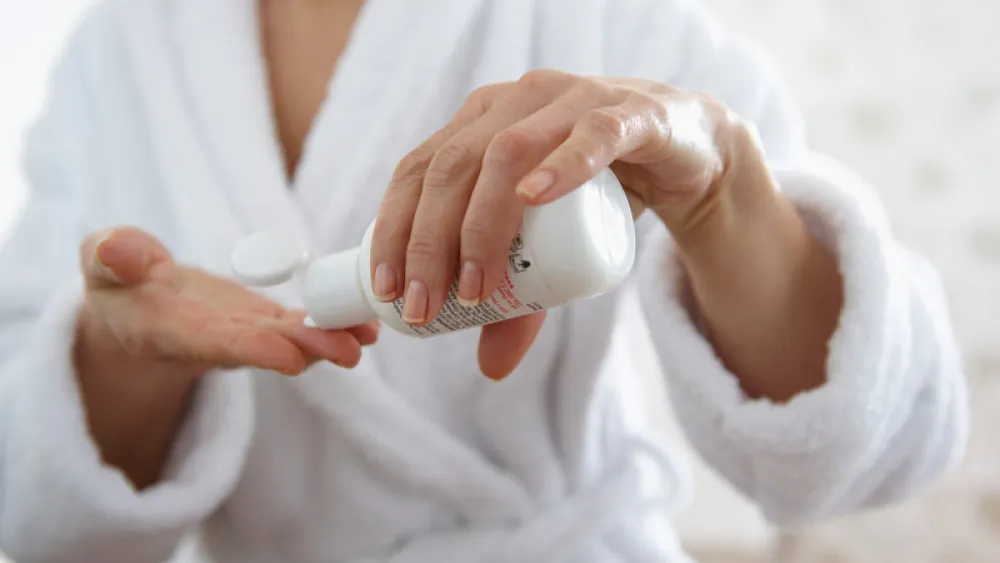




Cancer Care
Caring for Your Skin During Cancer Treatment


Your skin is your body's largest organ. It takes the brunt of abuse from environmental exposures such as sun, wind and extreme heat and cold. It's also affected by medications we take.
Chemotherapy drugs are designed to attack all fast-growing cells. Unfortunately, while their goal is to stop cancer cells from multiplying, they don’t distinguish between those cells and healthy ones. Good cells, like those which grow our hair, skin and nails, can become compromised. That’s why when going through cancer treatments, such as chemotherapy and/or radiation, our skin really needs more TLC than ever before.
Your skin needs moisture
Hydration is the key to maintaining your skin. While drinking a lot of water is helpful for hydrating on the inside, it’s also really important to hydrate our bodies on the outside. Dryness can cause discomfort, tearing of the tissue and aging skin.
Let’s look at some ways you can hydrate your body and protect your skin from dehydration.
Basic skin care tips
Exfoliation
Proper exfoliation removes some of the dead skin cells on the top of your skin, clearing the way for your skincare products to sink in. I always tell my clients to use whatever exfoliator works for them. It’s a personal choice. If you buy an exfoliator for your face, make sure it has a fine grit so it doesn’t tear your skin. You also may want to do a test patch on your face if you find that you are more reactive or sensitive during your cancer treatment. Exfoliating once or twice a week is sufficient.
Cleansing
Cleanse your skin morning and night. It’s important to choose your cleansers wisely. Stay away from sulfates and parabens. Sulfates are chemically derived detergents that can strip the moisture from your skin. Parabens are chemically derived preservatives that give products a longer shelf life. There are many hypo-allergenic and organic cleansers that are much better at hydrating your skin.
Avoid cleansers that make your skin feel squeaky clean. Many people with oily skin like this feeling, but it’s important to remember that oily or combination skin can become dehydrated too! Most oily skin types will not be quite as oily when undergoing treatment.
If you have dry skin, use a good cleansing cream or soapless gel. Stick with something creamier in consistency.
Toners
Choose an alcohol-free toner. Here at Inner Beauty, we carry a great one by DermOrganic®. Alcohol can dry out the skin and may cause irritation.
Facial skin repair
An anti-aging serum or repair should come just before moisturizing. There are many options out there and sometimes what you need depends on the season.
Something that has hyaluronic acid in it is a PLUS. Hyaluronic acid is a moisture binder. Also look for other key antioxidant ingredients that help with hydration, such as:
- Ceramides
- Peptides
- Retinol (vitamin A)
- Coenzyme Q10
- Resveratrol
- Vitamin C
- Grape seed
- Plant extracts
Some chemotherapy drugs can cause a darkening of the skin called hyper-pigmentation. While it does subside after treatment, using vitamin C serum can help keep it bay and minimize it during treatment. I've had countless clients tell me how this has made them feel more comfortable in their skin while dealing with hyper-pigmentation. There are different strengths of vitamin C serums on the market. Before you use it all over, do a test patch on your skin to make sure what you've chosen isn’t too strong.
Essential oils are another option. Orange essential oil is a great place to start. Dilute it by using a bit of fractionated coconut oil, then gradually work your way up to a higher strength. It important to use a high grade essential oil such as doTerra or Young Living. These brands do not have synthetics (artificial ingredients) in them.
Moisturizing
There are many great moisturizers out there. And as this is one of the most important steps in your regimen, I always suggest layering.
Moisturizing for the face
If you are oily, choose a hydrating lotion. If you are on the drier side, I suggest choosing cream that gives you the hydration you need. Try a daytime and a nighttime moisturizer. A morning moisturizer will be lighter, while a nighttime moisturizer will offer more hydration.
You can layer your face moisturizers by starting out with a coconut, emu, argan or jojoba oil and then apply the lotion or cream to your face. Do this both in the morning and at night.
Moisturizing for the body
When you shower, be sure to use warm water instead of piping hot. This will help protect your skin. After you get out, apply a layer of coconut oil while your skin is wet. You can use it all over – even on your scalp if you are without hair. The coconut oil mixed with the water will leave you with a light film on your skin without feeling greasy. The oils have an opportunity to sink in because your pores are nice and open after the warm steam. Towel dry, then after a few minutes apply your cream moisturizer to your body.
More moisturizing tips
How do you choose a coconut oil?
You want a product that is virgin, raw and organic. Fewer nutrients and antioxidants are stripped from the product when you see these words on its label.
Remember your feet too!
Apply oils to feet and put on cotton socks at night to sleep in. Be sure to put on socks, slippers or shoes before walking with oils on your feet! You don’t want to slip and fall!
Things to avoid
Stay away from products with petroleum and mineral oils. If the product contains petroleum, it will be listed first among the ingredients on the label. These products can coat the skin, masking hydration. We want your skin to breathe and heal, and while petroleum serves a purpose for many things, it can coat and suffocate the skin.
If you have any questions about how to best hydrate or care for your skin during cancer treatment, feel free to contact one of our licensed clinical cosmetologists at Inner Beauty salon. Our goal is to educate patients about services and products, regardless of where they receive their care. All consultations are complimentary and covered by donations.


